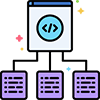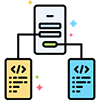High-Code Development

What Is High-Code Development?
High-code development is a way of programming apps and websites.
In this, the development process depends entirely on a team of professional coders. They write, deploy, and iterate codes to create apps with no limitations.
Using high-code has several advantages but also disadvantages. In this article, we’ll run you through each of these so you can decide whether it’s the right approach for your project.
Ready? Let’s begin!
Traditional High-Code Development
 Simply put, high-code is a traditional programming approach. A team of professional developers is responsible for writing and deploying the code. High-code enables the development of apps and websites that are unique and highly customizable.
Simply put, high-code is a traditional programming approach. A team of professional developers is responsible for writing and deploying the code. High-code enables the development of apps and websites that are unique and highly customizable.
High-code is heavily reliant on developers. This has both pros and cons. On the one hand, the high-code approach offers you the freedom to build apps with unique and innovative features. These features can be exclusive to your company or brand.
On the other hand, it is a more expensive, time-consuming, and slow approach compared with low-code as it requires skilled developers, project management and resources.
Pros of Using High-Code Development
 There are many advantages of using high-code, from exclusive features to unlimited customization and effective management.
There are many advantages of using high-code, from exclusive features to unlimited customization and effective management.
-
- Unique Features: One of the biggest advantages of using high-code is that it doesn’t limit developers in any way. Since developers write code from scratch, there’s plenty of room for creativity and innovation. In other words, you can build each component of your application without any limitations.
- High Levels of Customization: Unlike low-code, high-code offers high levels of customization. You can tweak and alter code to suit your needs. This is ideal for large-scale, complex projects that demand a lot of customization.
- Expert Standard: High-code is also a more professional approach to coding. Only IT experts with thorough knowledge of programming languages can build apps using high-code. In other words, you’re getting the best in the field to write code suited to your needs.
- Effective Management: High code solutions can be managed by IT professionals. The IT staff can update the apps, fix bugs, and offer support even when working remotely. They have complete control over each process.
Cons of Using High-Code Development
 Along with the pros, there are some limitations to using high-code. There’s a high dependency on professional developers and a lack of code reusability. The development process itself can be time consuming.
Along with the pros, there are some limitations to using high-code. There’s a high dependency on professional developers and a lack of code reusability. The development process itself can be time consuming.
-
-
-
- High Dependency: Using high-code can make you heavily dependent on IT developers. Even for simple tweaks or fixes, there’s nothing you can do without their help.
- Time Consuming: Since developers have to manually write code to build apps and websites, high-code is very time consuming. This slows down your overall development process and takes time away from other tasks you may want to focus on.
- Expensive Approach: Hiring a team of professional developers costs a lot of money. But that’s not the only factor to consider. High-code also demands resources like infrastructure and management that add up in the long run.
- Lack of Reusability: One of the biggest disadvantages of high-code is its lack of reusability. You can’t copy and paste the same code from one project into another. You have to write fresh code from scratch. This can make it a poor choice for apps that demand a lot of repetitive functions.
-
-
The Final Word
As we’ve seen, high-code development has both pros and cons. But is it the right approach for you?
On the plus side, it offers plenty of room for creativity and innovation. You have experts writing code that can be customized according to your needs down to the smallest detail. When it comes to app functionality, with high-code there are no limitations.
On the negative side, it makes you heavily dependent on IT developers. It is also more time and cost consuming. This can make it inaccessible for smaller businesses with more limited resources.
In the end, it all boils down to your needs. If the pros outweigh the cons for you, high-code is the way forward.
